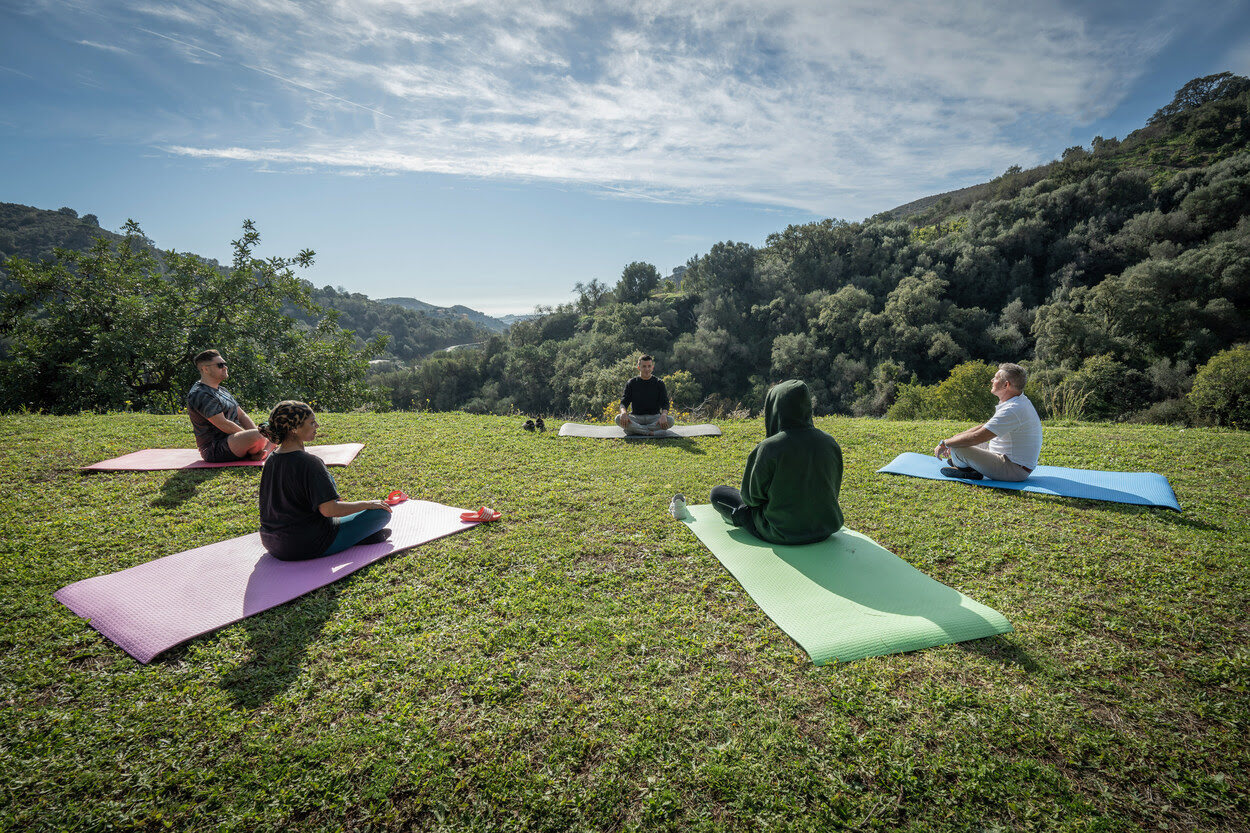
Yoga therapy training equips practitioners with the skills to address specific health challenges through tailored yoga practices. For those recovering together, couples yoga is an activity that can seriously strengthen relationships.
Furthermore, a yoga retreat in the UK or abroad can provide a conducive environment for healing. It combines the benefits of yoga with a change of scenery that can refresh the spirit and strengthen resolve. Engaging with global communities through platforms like Yoga International can be beneficial. It can extend support networks, providing access to a wealth of resources and collective wisdom.
Addiction, mental health and recovery
Addiction is a chronic disease that affects the brain in ways that extend beyond substance use. Initially, drug use may seem under control. Over time however, changes in the brain can reduce resistance to cravings. This makes drug use compulsive and difficult to stop despite harmful consequences.
Substance use disorders often coexist with mental health disorders, which can complicate both the progression and treatment of addiction. Approximately 38% of adults with substance use disorders also suffer from a diagnosed mental health condition. The Mental Health Foundation emphasises that mental health matters. They advocate for integrated treatment approaches, especially during Men’s Mental Health Month.
Activities like yoga therapy and meditation can significantly aid recovery by improving both mental and physical health. Activities that focus on restoring balance to the body and mind, such as those experienced during a meditation retreat, can enhance traditional treatment methods.
Recovery from addiction is about rebuilding and sustaining a healthy, balanced life. Engaging with therapies that encompass physical, mental, and spiritual health is crucial. These provide the tools necessary for managing stress and emotions, crucial for long-term recovery.
The basics of yoga
Yoga is an ancient practice that originates from India. It aims at promoting the integration of the mind, body, and spirit to achieve a state of enlightenment or self-realisation. Its practices include physical postures (asanas), breathing techniques (pranayama), meditation (dhyana), and ethical disciplines. Over centuries, yoga has evolved into various styles and schools. Each school has its own focus and techniques, but all aiming to enhance personal wellness and spiritual connection.
Types
Among the many styles of yoga, some of the most popular include Hatha, Vinyasa, and Kundalini. Hatha yoga is often slow-paced and focuses on breathing and meditation. It is suitable for beginners and those who prefer a more relaxed approach. Vinyasa yoga, known for its fluid, movement-intensive sequences, appeals to those who desire a more vigorous workout. Kundalini yoga, distinguished by its combination of spiritual and physical practices, involves dynamic breathing techniques, chanting, and meditation. The goal is to awaken the energy at the base of the spine known as kundalini.
Chakra meditation in yoga
Chakra meditation is a form of meditation that is often integrated into yoga practices to enhance the balance of the chakras—energy centres in the body according to Indian thought. This form of meditation helps to promote energy flow throughout the body. It is believed to improve physical and emotional health. The focus on aligning the chakras can be particularly beneficial in addiction recovery, as it encourages a deeper sense of stability and inner peace.
Yoga for detoxification
The physical postures and breathing exercises enhance blood circulation and support liver and kidney function. The concept of a dopamine detox, reducing the overload of dopamine from addictive behaviours by substituting them with yoga and meditation, aligns well with yoga.
Psychological benefits of yoga therapy in recovery
By integrating movement, breathing, and meditation, yoga therapy addresses various psychological issues such as anxiety, depression, and the deep-seated emotional turmoil associated with addiction. Practitioners work closely with recovering individuals, applying specific yoga sequences and breathing exercises that help manage stress and regulate emotions.
Couples yoga
Couples yoga involves partners participating in yoga exercises together, which can enhance communication and reinforce emotional bonds often weakened by addiction. This shared activity not only promotes physical health but also cultivates intimacy and trust, crucial elements that are often eroded in relationships affected by substance abuse.
Yoga therapy retreats
Participating in a yoga retreat in the UK or abroad offers individuals in recovery a unique opportunity to immerse themselves in their healing journey. Yoga retreats provide a structured and supportive environment where participants can focus entirely on recovery without the distractions of daily life. These retreats often include a combination of therapeutic yoga sessions, meditation practices, and workshops that teach coping strategies to deal with cravings and triggers. The serene settings, often surrounded by nature, contribute significantly to emotional healing and stress reduction.
Physical benefits of yoga therapy in recovery
Yoga plays a crucial role in the physical restoration of individuals recovering from addiction. By engaging in yoga, individuals begin to rebuild their physical strength, flexibility, and overall wellness, which are often compromised due to substance abuse. Yoga postures aid in detoxifying the body, supporting essential functions like immune response and digestion, and improving cardiovascular health.
Stress reduction
Yoga achieves this by activating the parasympathetic nervous system, which helps calm the body and mind, lowering cortisol levels, the stress hormone. This reduction in stress is not only beneficial for physical health but also enhances mental clarity and emotional stability, helping individuals manage cravings and maintain sobriety.
Self-awareness
The mindfulness and introspection through yoga encourage practitioners to explore their emotional states deeply. This process helps individuals understand and regulate their emotions more effectively, leading to improved emotional resilience and reduced susceptibility to relapse.
Implementing yoga therapy into recovery
For starters, gentle yoga styles like Hatha are recommended as they focus on slow movements and breath control, providing a gentle way to engage the body and mind in the recovery process.
Successful incorporation of yoga into recovery programs involves creating a supportive environment that encourages regular practice. This can include setting realistic goals, creating a serene space free of distractions, and being part of a community that supports each other’s recovery journey. Many recovery centres, including InnerLife Recovery in Marbella, have successfully integrated yoga into their programs, demonstrating its effectiveness in enhancing well-being, reducing stress, and preventing relapse.
Yoga enhances physical health, reducing stress, and also boosting emotional healing. By integrating yoga with traditional treatment methods, individuals can achieve a more balanced recovery journey. For those exploring complementary therapies, InnerLife Recovery offers programs that incorporate yoga, providing a supportive environment to nurture recovery. Consider embracing yoga as part of your comprehensive approach to overcoming addiction and enhancing overall well-being. Reach out to us today to learn more.






